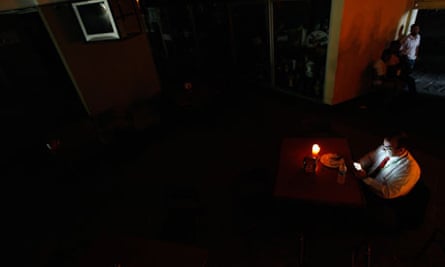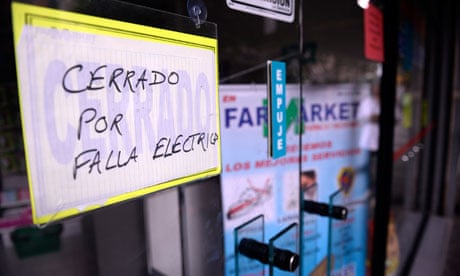Venezuela was plunged into darkness on Tuesday when the country's main power distribution network failed, depriving 70% of the country of electricity and creating traffic chaos in much of Caracas.
The electrical energy minister, Jesse Chacón, appeared on state TV to explain that the failure was in the "backbone" that carries electricity from the Bajo Caroni region, where 60% of Venezuela's power is generated.
President Nicolás Maduro said on Tuesday night that 14 of 23 states had lost power for much of the day and blamed "sabotage", suggesting opposition groups were responsible. He said service had been progressively restored with some exceptions, including the oil-producing state of Zulia. Maduro blamed "the extreme rightwing", as he has in the past, via Twitter.
Power was restored in Caracas by nightfall.
Despite possessing the world's largest proven oil reserves, Venezuela has been plagued in recent years by worsening power outages, but they have rarely reached metropolitan Caracas, home to more than one-sixth of the country's 28 million people.
Maduro said the oil industry, the lifeblood of the economy, had not been affected by the outage.

In an evening broadcast on state TV, he claimed the outage was "part of a low-level war" on what his government refers to as "the revolution" begun by the late president Hugo Chávez, Maduro's political mentor but provided no evidence to support his accusations of sabotage.
Maduro said he had ordered the military to protect the entire country.
The capital's subway service was temporarily interrupted and the authorities evacuated passengers from several trains.
Opposition politicians say the government, while spending billions on programmes for the poor, has not invested sufficiently in the electrical grid and generating plants to keep up with growing demand.
Authorities say delays in several initiatives designed to boost electricity output are partly to blame.
Chacón, a long-time close aide to Chávez, was named energy minister after Maduro won the election in April by a thin margin. The previous energy minister was Chávez's brother, Argenis.
Chávez died in March after 14 years in power. Maduro was his foreign minister and later, while Chávez was dying of cancer, his vice-president.
